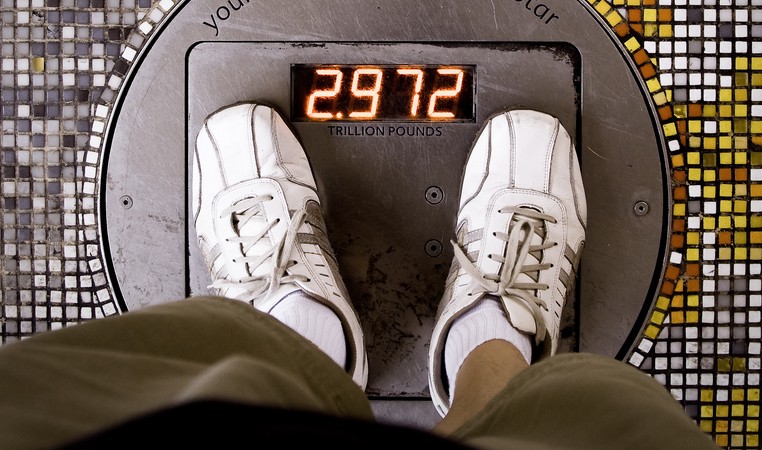
5 Tips for Healthy Weight Loss
Photo Credit: Benson Kua, via Flickr Creative Commons
Your health and weight are intimately connected. The good news is you can eat more and weigh less – that’s right, you can lose weight without feeling deprived or hungry.
Rapid weight loss can lead to unintended loss of lean body mass, which can cause a slower metabolism.
According to the Centers for Disease Control and Prevention, if your Body Mass Index (BMI) falls into the range of overweight or obese, you are at a higher risk for the following diseases and conditions:
- Coronary heart disease
- Stroke
- Type 2 diabetes
- Cancers (endometrial, breast and colon)
- Hypertension or high blood pressure
- Dyslipidemia (high blood cholesterol, high blood triglycerides)
- Fatty liver disease
- Gallbladder disease
- Sleep apnea and respiratory problems
- Osteoarthritis (degeneration of cartilage and its underlying bone within a joint)
- Gynecological problems for women (abnormal menstrual periods and infertility)
During the past 20 years, there has been a dramatic increase in obesity in the United States. Rates remain high and in fact, the latest Gallup-Healthways Well-Being Index reported that in 2014, 27.7% of the nation moved into the obese category. Approximately 17% (or 12.7 million) children and adolescents between the ages of 2-19 years are obese.
Rapid weight loss can lead to unintended loss of lean body mass, which can cause a slower metabolism that inhibits continued weight loss and often results in a rebound of weight gain.
Here is a handy BMI calculator to help calculate your BMI. For those who are overweight or obese, even a small weight loss of 10% of body weight over a period of six months can improve health and reduce risk factors for disease. Weight loss can also increase energy, and improve your sleep, mood, self-esteem and overall quality of life.
- If your BMI is less than 18.5, it falls within the “underweight” range.
- If your BMI is 18.5 to 24.9, it falls within the “normal” or Healthy Weight range.
- If your BMI is 25.0 to 29.9, it falls within the “overweight” range.
- If your BMI is 30.0 or higher, it falls within the “obese” range.
Experts agree that the key to successful weight loss with sustainable weight management is adopting a healthy lifestyle, such as the four-element approach of Dr. Dean Ornish’s Program for Reversing Heart Disease. The Ornish Lifestyle Medicine approach was ranked among the top 20 diets for weight loss; however, it is much more than a diet.
It is a lifestyle that is built on four equally weighted elements that include:
- Nutrition: what you eat
- Exercise: how much activity you have
- Stress Management: how you respond to stress
- Love and Support: how much love and support you have
These four elements work synergistically together to support overall improved health outcomes, including weight loss.
Each element has significant benefits for weight loss. For example, exercise has been shown to be a significant factor for weight loss and weight management, and when included as part of a balanced, integrated approach, the outcomes may be even more sustainable and comprehensive. This includes lower cholesterol and other quality of life improvements, such as better sleep, enhanced energy and mood from feel-good brain chemicals released during exercise. The research conducted by Dr. Ornish and his colleagues in the Lifestyle Heart Trial showed an average weight loss of 24 pounds in the first year, with sustained weight loss in most after five years.
Achieving Healthy Weight Loss
The pace for healthy weight loss is 1/2-2 pounds a week. The first one to two weeks you may experience a more rapid weight loss due to loss of water weight in addition to fat loss and some muscle loss. For healthy and successful long-term weight loss, however, the pace should slow to a steady and more moderate rate that supports a decrease in the percentage of fat without sacrificing lean (muscle) body mass.
This initial weight loss drop from water weight is the result of the body’s initial need for extra energy when calorie intake drops, along with perhaps increased expenditure. The body responds to this extra need for energy by releasing stores from a type of carbohydrate found in the muscles and liver called glycogen. Glycogen is partly made of water so when burned for energy, it releases water, which results in the initial weight loss. This tends to taper off after the first week when the body adjusts to the lifestyle changes.
After the first couple of weeks, weight loss should taper to a moderate loss of 1/2-2 pounds. Even though the goal is to achieve continued weight loss, a rapid loss that exceeds three pounds a week can increase the risk of gallstones and gallbladder disease.
Rapid weight loss can also lead to unintended loss of lean body mass, which cause a slower metabolism that inhibits continued weight loss and often results in a rebound of weight gain. This rapid weight loss and gain can lead to yo-yo dieting, which results in an increasing rate of the percentage of body fat to lean muscle weight. Slower weight loss results in more effective weight loss from fat and a preservation of lean body mass. In addition, one study showed that a slower and steady weight loss led to improved triglyceride levels and blood pressure.
5 Tips for Healthy Weight Loss
1. Choose Plant-Based, Low-Fat, Nutrient-Rich Foods Instead of Calorie-Dense Foods
When following a plant-based approach such as the Dr. Dean Ornish’s Program for Reversing Heart Disease, or Ornish Spectrum Group 1, weight loss is a natural outcome, often without even trying to lose weight. As the title of Dr. Dean Ornish’s book Eat More, Weigh Less indicates, it is easy to eat more and weigh less when eating nutrient-dense foods versus calorie-dense foods. One can have a high volume of food and not feel deprived because of the difference in calorie density.
For example, one Tablespoon of olive oil (or any oil) has 120 calories. You can have almost five cups of vegetables for the same amount of calories, or a large salad with ¼ cup of garbanzo beans.
Dr. Ornish has recommended:
An optimal diet for preventing disease and staying healthy is a whole foods, plant-based diet naturally low in animal protein, low in harmful fats, and low in refined carbohydrates.
An optimal diet for reversing disease and staying healthy is a whole foods, plant-based diet, low in harmful fats, and low in refined carbohydrates (no animal protein).
- High in “good carbs” (including vegetables, fruits, whole grains, legumes, and soy products in their natural forms)
- Low in simple and refined carbohydrates such as sugar, high fructose corn syrup, white flour
- 4 grams/day of omega‑3 fatty acids found in fish oil, flax oil, plankton-based oils)
- Low in “bad fats” (trans fats, saturated fats, hydrogenated fats)
- More quality, less quantity (smaller portions of good foods are more satisfying than larger portions of junk foods, especially if you pay attention to what you’re eating)
2. Eat Small, Frequent, Balanced Meals and Snacks Throughout Day, But Remember that Total Calories Count the Most
The evidence is mixed about whether eating small, frequent healthy meals and snacks affects weight loss. This approach has many advantages, especially for those with diabetes.
Planning for smaller, more frequent healthy and balanced meals can help ward off hunger because you will avoid overeating. This approach also keeps your blood sugar level stable throughout the day.
A recent study at the University of Warwick showed that regardless of the size and frequency of one’s meals, total calories contribute most to weight loss.
3. Stay Hydrated with Water, Not Liquid Calories
Staying well hydrated is important for health and supports weight loss. That’s because our brains can miscommunicate thirst for hunger, leading us to consume extra calories when we really need hydration. Studies support the importance of staying well hydrated for weight management and health. Drinking a glass of water prior to eating can also curb our appetite, which helps to limit excess calories.
Liquid calories in beverages such as soda, sweet tea, lemonade, and even juice can be quickly consumed, but do not satisfy hunger and therefore easily add excess calories. Liquid calories can also have a negative impact on blood sugar management. Eating a whole fruit such as an apple provides fiber that slows down the release of sugars and absorption into the bloodstream. This approach will level blood sugar versus the quick rush and blood sugar spike that can result from liquid calories such as juice. Studies show that limiting liquid calories supports weight loss and effective weight management.
4. Practice Mindful Eating
Being mindful and aware of what, how and when we are eating can make a significant impact on weight management, along with making healthy choices that affect our overall health and well-being. A study published in the Journal of Academic Nutrition Diet demonstrated that by applying mindful eating, participants ate less, lost more weight, and had better managed blood sugar levels.
5. Practice the Four-Element Lifestyle Approach
Fitness: Engage in regular and moderate exercise. The Ornish comprehensive lifestyle approach encourages aerobic exercise with a minimum of 30 minutes a day or for an hour every other day for a total of 3-5 hours of aerobic exercise per week. *Always talk to your physician before starting an exercise program.
Stress Management: Developing a daily practice and routine is important to reap the rewarding benefits of stress management. The link between our emotional state, weight and overall health is clearly connected.
While the immediate response to acute stress will decrease our appetite, chronic stress increases it and can lead to weight gain. When the body reacts to stress, hormones are released that provide quick energy to help the body “flee from the stress” to safety in the ancient case of running from a saber-toothed tiger. We need energy to escape or fight the stress, which slows down digestion and decreases our appetite in order to use all our resources to escape or fight the stressor. In order to recover from this reaction, the body’s response is an increased appetite to refuel for recovery.
Modern stress, however, differs from this acute type stress and the stress response of fight or flight turns into “stew and chew,” which means we eat more and exercise less when we are worried, frustrated or angry over the factors that are making us stressed. Reaching for unhealthy food choices is often an attempt to fill this ravenous appetite and soothe or numb the stressful feelings. This behavior does not eliminate the stress and instead it often exacerbates it.
Love & Support: Giving and receiving love and support makes us healthier and happier. When we feel better, it is easier to make healthy choices, including the food we choose to eat. Love and support provides us with the need for love and intimacy we long for and often seek out in a bowl of ice cream or bag of chips in its absence. There is deep hunger in our society for love, intimacy and connection. We all need it, and it is at the root of what makes us well and what allows us to make healthy and mindful choices. When we are able to meet this need through meaningful love and connection with others, we no longer need food to fill this void. Instead, we are filled with the love and intimacy that we ultimately need.
Nutrition: Foods are neither good nor bad, but some are more healthful for you than others. You have a spectrum of choices. We recently updated our nutrition guidelines.
Are you at a healthy BMI? If not, what’s the first step you can take to move towards a healthier weight?







